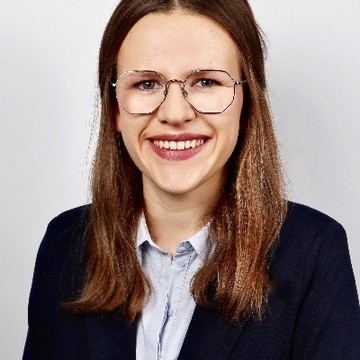Corporate Knowledge Management
IS 614 for Master's program (MMM and Business Informatics)
General Information
| Performing Lecturer | Dr. Monica Fallon & Dr. Anna-Maria Seeger |
|---|---|
| Examiner | Dr. Monica Fallon & Dr. Anna-Maria Seeger |
| Course Format | Lecture |
| Credit Points | 6 ECTS |
| Language | English |
| Grading | Written exam (100% or 80%) with optional Case Study (0% or 20%) |
| Exam Date | TBA |
| Information for Students | All course materials will be available on Ilias. Information about the optional case study and registration for it will be provided on the first day of the course. |
| Course materials | ILIAS group |

Mechthild Pieper
Contact person Corporate Knowledge Management
For further information please contact Mechthild Pieper.
Course Information
Brief Description
Companies have realized that the knowledge of their professionals is a decisive factor in competition. Firms are able to differentiate against their competitors through superior knowledge in the long term. This lecture deals with the question of how the identification, acquisition, organization, storage, distribution, and use of knowledge can be supported with the help of information technology and where the limits of such efforts are.
Aim of Module
Students will acquire specific knowledge about the challenges of corporate knowledge management. After completion of the course, students have developed a thorough understanding of the creation, storage, retrieval, and transfer of knowledge. Students will be acquainted with the repertoire of analytical concepts regarding the strategic planning, architectures, implementation, and evaluation of integrated knowledge management systems.
Course Outline & Schedule
Lecturer Dr. Monica Fallon & Dr. Anna-Maria Seeger Schedule
Date Time Topic Dozentin Room 12.9. 10:15–11:45 Introduction Dr. Anna-Maria Seeger O 151 19.9. 10:15–11:45 Knowledge Creation Dr. Anna-Maria Seeger O 151 26.9. 10:15–11:45 Knowledge Transfer Dr. Anna-Maria Seeger O 151 10.10. 10:15–11:45 Knowledge storage and retrieval Dr. Monica Fallon O 151 17.10. 10:15–11:45 The effects of artificial intelligence on knowledge management Dr. Monica Fallon O 151 18.10 *Deadline: Sign-up for case study group work E-Mail 23.10 *Case study group assignment E-Mail 24.10 10:15–11:45 *Guest Lecture and Case Study Kick-off Bain & Company O 151 31.10 10:15–11:45 Designing knowledge management systems Part I Dr. Monica Fallon O 151 07.11 10:15–11:45 Virtual Q&A Session (30 min) Designing knowledge management systems Part II Bain & Company Dr. Monica Fallon O 151 14.11 10:15–11:45 The use of knowledge management systems Dr. Monica Fallon O 151 21.11 10:15–11:45 Buffer Dr. Monica Fallon O 151 28.11 10:15–11:45 *Deadline: Case study presentations Bain & Company O 151 05.12 10:15–11:45 Recap + exam preparation Mechthild Pieper O 151 TBD TBD Final Exam TBD TBD *These sessions are for students participating in the optional case study. If you choose to participate in the case study, the case study will be worth 20% of your grade and the exam will be worth 80%.
Literature
- Alavi, M., & Leidner, D. E. (2001). Knowledge management and knowledge management systems: Conceptual foundations and research issues. MIS quarterly, 107–136.
- Becerra-Fernandez, I. (2004). Knowledge management: Challenges, solutions, and technologies.
- Irma Becerra-Fernandez, R. S. (2001). Organizational knowledge management: A contingency perspective. Journal of management information systems, 18(1), 23–55.
- Dennis, A. R., & Vessey, I. (2008). Three Knowledge Management Strategies: Knowledge Hierarchies, Knowledge Markets, and Knowledge Communities. MIS Quarterly Executive, 4(4), 4.
- Fan, W., Wallace, L., Rich, S., & Zhang, Z. (2006). Tapping the power of text mining. Communications of the ACM, 49(9), 76–82.
- Hansen, M., Nohria, N., and Tierney, T. (999). What’s your strategy for managing knowledge? Knowledge Management: Critical Perspectives on Business and Management, 77(2), 322.
- Kankanhalli, A., Tan, B., and Wei, K. (2005). Contributing knowledge to electronic repositories: An empirical investigation. Management Information Systems Quarterly, 29(1), 7.
- Kudaravalli, S., Faraj, S., and Johnson, S. (2017). A configural approach to coordinating expertise in software development teams. MIS Quarterly, 41(1), 43–64.
- Ko, D.-G., Kirsch, J., and King, W. (2005). Antecedents of knowledge transfer from consultants to clients in enterprise system implementations. MIS Quarterly, 29(1), 59–85.
- Nevo, D. and Wand, Y. (2005). Organizational memory information systems: a transactive memory approach. Decision Support Systems, 39(4), 549–562.
- Nonaka, I. and Takeuchi, H. (1995). The knowledge-creating company: How Japanese companies create the dynamics of innovation, Oxford University Press, Cambridge, MA.
- Zhang, X. (2017). Knowledge Management System Use and Job Performance: A multilevel contingency model, MIS Quarterly, 41(3), 811–840.